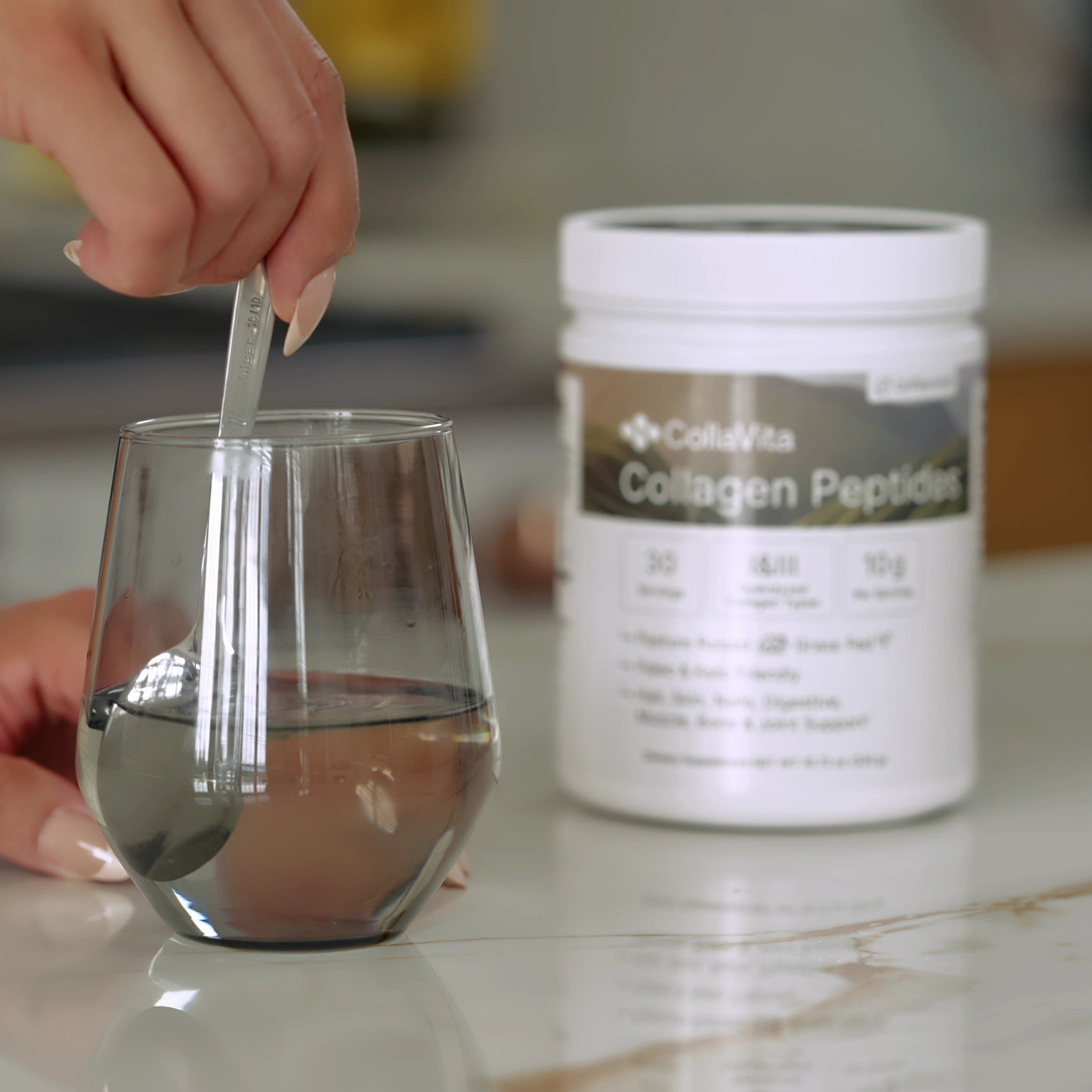Why is Collagen Particularly Important for Men?
Collagen is essential for developing and maintaining strong muscles, healthy joints, proper brain function, and beautiful skin. It aids in muscle development and strengthening and makes up about 1% to 10% of our muscular mass. When exercising, you need to pay extra attention to building muscular fibers, which collagen helps with.
Collagen supplements for men also keep the joints flexible and pain-free and protect joint health by reducing inflammation. It also protects the brain against diseases such as Alzheimer's and prevents it from aging faster. Collagen is also important for skin health, as men's skin wrinkles faster than women's. Collagen peptides, on the other hand, help the body produce its own collagen and allow us to use the collagen in our diet more efficiently.
The CP (Collagen Peptides) group exhibited a decreased incidence of waking up and a lower overall frequency of awakenings over a 7-day period measured using polysomnography, a test that records and evaluates the body's physiological processes during sleep, according to the study in the European Journal of Nutrition(1). Further, the Stroop cognitive test exhibited a greater proportion of correct replies in the CP group.
5 Comprehensive Benefits of Collagen for Men
Although collagen loss occurs more rapidly in women, its effect on skin and muscle is more noticeable in men. Notably, the long-term benefits of collagen for men combined with resistance exercise positively impact body composition and strength in men. Specifically, collagen peptide supplementation increases lean body mass, whereas muscle fiber cross-sectional area increases in both groups, according to the study in the Nutrients(2).
1. Enhances Skin Health and Appearance
Men develop wrinkles faster than women until they reach about 65, at which point they plateau. However, women begin to develop signs of aging more rapidly beyond 70. Thus, supplemental collagen is especially crucial for males because of their increased propensity to develop wrinkles. It is a key component of healthy skin.
In 100 participants aged 30-60 years, a daily intake of 1650 mg collagen hydrolysate (CPNS) for 12 weeks significantly improved skin desquamation and hydration at the end of 4 weeks and skin wrinkles and elasticity at the end of 12 weeks compared to the placebo group, according to the study in the Food & Function(3).
2. Supports Joint Health and Mobility
Collagen has several effects that support joint health and mobility. Firstly, it protects joint health by reducing inflammation. Inflammation causes the breakdown of proteoglycans in joints, while collagen supports these structures, reducing these negative effects. Collagen also helps to rebuild and repair cartilage, making joints more flexible and reducing pain.
Collagen is a critical component of joint health. It is an essential part of the extracellular matrix, providing structural support to joints and maintaining their functionality. A collagen deficiency can lead to the breakdown of proteoglycans in the joint, which can lead to poor joint health. Collagen supplementation can reverse this process and reduce joint damage.
3. Boosts Muscle Mass and Strength
Collagen's amino acids, arginine, and glycine, enhance muscle growth and strength by augmenting natural creatine synthesis. During training, men build type 2a muscle fibers that are more reactive and faster, and collagen is essential for their development. In addition, men need more protein and collagen to support type 2a muscle fibers than women. Through its role in the fusion of satellite cells into muscle fibers and in maintaining muscle structure, collagen aids in the correct development of muscles.
Over a period of 12 weeks, 53 men (average age 72) supplemented their resistance training regimen with 15 grams of collagen peptide daily. Results showed that lean body mass, bone mass, muscle strength, and sensory-motor control significantly increased, while fat mass decreased in all participants, according to the study in the British Journal of Nutrition(4). These improvements were more pronounced in the group receiving collagen peptides.
4. Promotes Heart Health
Collagen plays a critical role in maintaining vascular health by supporting the internal structure of blood vessels. Thus, it protects against aneurysms, which may result from the weakening and thinning of blood vessels as we age. Furthermore, vitamin C, lysine, and proline, all of which are essential for collagen production, contribute to vascular health by correcting endothelial dysfunction in the inner walls of blood vessels.
Hydrolyzed collagen supplements have also been shown to strengthen the vascular structure, thereby offering protection against these problems. Notably, some heart patients who take hydrolyzed collagen supplements experience normalized blood pressure and a reduced need for heart medications.
There is evidence that taking collagen peptide supplements (CPS) will reduce systolic blood pressure and serum LDL levels while increasing lean body mass and decreasing fat mass, according to a study in the British Journal of Nutrition(5). Nevertheless, glycaemic indicators were unaffected by CPS. Based on these findings, CPS may improve body composition and reduce some risk factors for cardiovascular disease.
5. Aids in Digestive Health
Proper digestion relies on a strong gut wall, which collagen helps maintain. When a "leaky gut" occurs, inflammation, specific drugs, or dietary sensitivities penetrate the gut wall, which is only one cell thick. Leaky gut symptoms are alleviated when collagen helps mend these tiny tears in the intestinal lining.
In addition to serving as a help in fat digestion and detoxification, the glycine amino acid that is present in collagen is critical for the protection of the intestinal wall. Peptogenic properties, which collagen also demonstrates, help reduce acidity and ulcer symptoms.
Furthermore, collagen can help with digestive health by lowering inflammation-related disorders. Consuming collagen supplements can help restore the collagen composition of the gut wall, improving gut health, increasing energy levels, and even improving nutrient absorption.

How Does Collagen Deficiency Affect Men?
Collagen deficiency manifests itself in a variety of ways, including but not limited to skin wrinkles and fine lines, aches and pains in the joints, hair, and nails that are weak and brittle, weakened muscles, decreased bone density, and gastrointestinal issues. Skin sags and wrinkles, stiff and painful joints, thinning hair, and brittle nails are all symptoms of low collagen levels. Muscles have a harder time healing, bone density drops, fractures become more likely, and permeable bowel syndrome can develop as the intestinal wall loses its protective characteristics.
Insufficient collagen can eventually result in serious health issues like osteoporosis, arthritis, accelerated skin aging, muscle weakness, chronic digestive disorders, and an increased risk of injuries, the study found in the AMA Arch Ophthalmol(6).
Best Sources of Collagen for Men
Collagen is a protein that is the body's basic building block and is essential for muscle, joint, and bone health, especially for men. Here are the best collagen for men:
- Bone Broth: Bone broth is one of the best sources of collagen. It is derived from the prolonged boiling of chicken, beef, or lamb bones and encompasses all essential amino acids required for collagen synthesis in the body.
- Salmon: Salmon cooked with its skin is an excellent source of collagen. Wild salmon should be preferred. The skin of salmon is rich in collagen, and therefore it is recommended to consume it with the skin.
- Chicken Thighs and Legs: Chicken thighs and thighs with skin are good sources of collagen. The skin and the cartilaginous areas at the ends of the bones are especially rich in collagen. Skinless and boneless chicken breasts are less rich in collagen.
- Ribs: The membrane on the ribs contains pure collagen and provides all the amino acids the body needs to make collagen.
- Eggs: Egg yolks are a source of collagen, and the delicate membrane located between the shell and the egg post-boiling is also abundant in collagen. Egg whites also comprise amino acids vital for collagen synthesis.
- Sardines and Anchovies: Small fish such as sardines and anchovies are rich sources of collagen when consumed with their bones and cartilage. Their low mercury content and high omega-3 fatty acid content provide additional benefits.

Collagen Supplements
Collagen supplements can be particularly advantageous for individuals who do not consume an adequate amount of collagen in their diet. Each collagen supplement has its own benefits.
Hydrolyzed collagen is produced by breaking down collagen molecules via peptide chain digestion. This makes hydrolyzed collagen easier for the body to absorb. Molecular size is a direct correlation to the effectiveness of dietary supplements that contain hydrolyzed collagen. Because of their small molecular weights or low daltons, these supplements are more bioavailable and effective. Moreover, superior hydrolyzed collagen supplements are produced through enzymatic hydrolysis. Enzymes, not acids, are used to break the collagen molecules into smaller pieces in this process.
How to Integrate Collagen into Your Daily Routine?
Several natural food sources and supplements help you integrate collagen into your daily routine. For breakfast, try eating collagen-rich foods like eggs, bone broth, and sardines. When it comes to lunch and dinner, opt for skinned chicken, turkey, salmon, and ribs. For snacks, bone broth, and sardines are great choices as well.
Collagen supplements can also easily increase your consumption. Soups, salads, and smoothies are some of the many dishes that benefit from their addition. They are available in liquid, powder, and capsule form. In addition to collagen, other nutrients like copper, zinc, vitamin A, vitamin C, and manganese are essential for collagen formation. To further improve your body's collagen production, it is recommended to maintain a healthy lifestyle and exercise regularly.
Conclusion

















